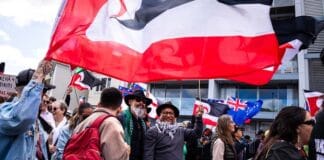ONE HUNDRED and twenty people packed a meeting of the Aboriginal Rights Coalition in Redfern in April to hear first-hand the impact of the intervention on remote communities in the NT.
Vince Forrester, an elder from the Mutijulu community at Uluru, declared that he had come to Sydney to tell people in the city “what’s really going on”. He spoke of the third world conditions in the community and how the intervention was making the situation worse.
“In Mutitjulu they’ve closed our high school… we had two doctors and health workers and since the intervention we’ve got only one nurse, no doctors, no health workers… they haven’t been replaced”, he said.
He also outlined how police intimidation and welfare quarantining were forcing people from the community. Forrester warned that they would not give up their land without a fight and would “close the climb” (up Uluru) if necessary.
Darren Dick of the Human Rights and Equal Opportunity Commission reported on their “Social Justice Report 2007”. The report found the intervention contravened local and international human rights laws, specifically the Racial Discrimination Act (RDA).
Recently returned from visiting the Bagot town camp on the outskirts of Darwin, Monique Wiseman spoke about conditions there. She had seen the community inundated with people forced from remote communities to access their “managed income” in Darwin. The population has jumped from 500 to 1200 and yet there are only 52 houses, with only three working stoves and ten refrigerators.
The Bagot store, which put money back into the community and helped pay for funerals, has not been registered under the welfare quarantining system and is going broke. “There is now a backlog of people waiting to be buried in Bagot, because people just can’t afford the funerals”, she said.
The meeting resolved to continue the campaign, endorsing the June 21 national day of action.
By Sarah Thorne





